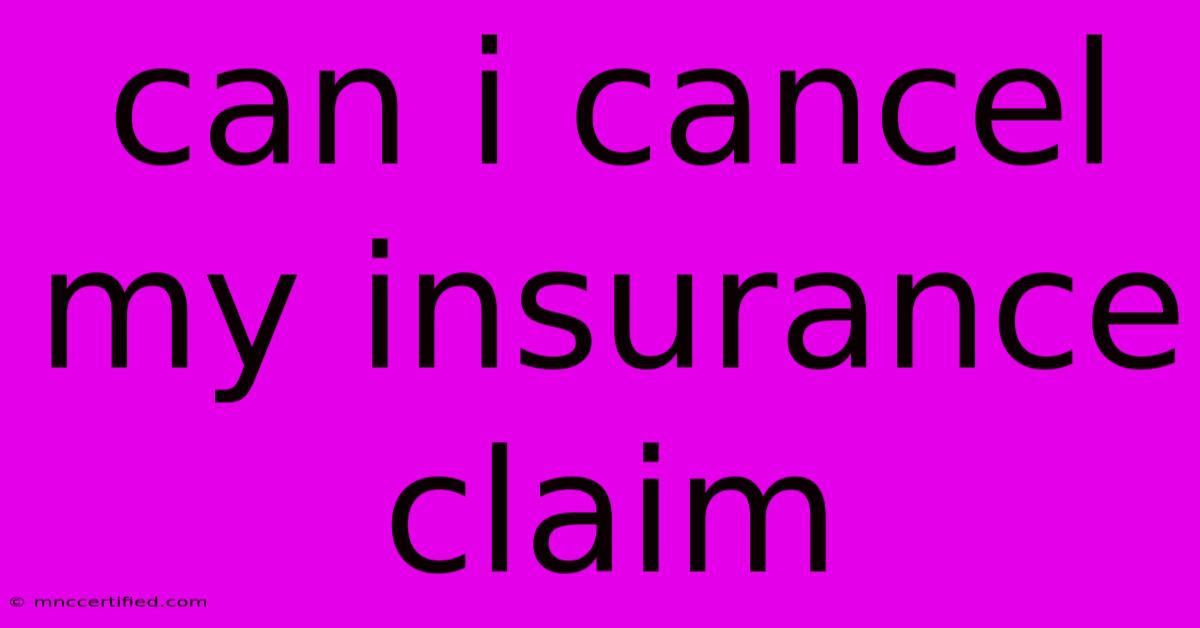Can I Cancel My Insurance Claim

Table of Contents
Can I Cancel My Insurance Claim? A Comprehensive Guide
Thinking about canceling your insurance claim? It's a significant decision with potential consequences. This guide explores when you can cancel, the process involved, and the implications of your choice. Understanding your rights and options is crucial before making such a move.
When Can You Cancel an Insurance Claim?
The ability to cancel an insurance claim depends heavily on your specific circumstances, the type of insurance, and the stage of the claims process. There's no universal "yes" or "no." Here are some key scenarios:
Before the Claim is Processed:
This is generally the easiest time to cancel. If you've reported the incident but the insurance company hasn't yet started investigating or assessing the damages, you usually have the option to withdraw your claim. This might be the case if you:
- Solved the issue independently: Perhaps you reached a settlement with the other party involved, or you've repaired the damage yourself.
- Realized a mistake: You might have overestimated the damages, or incorrectly reported the incident.
- Changed your mind: For whatever reason, you might no longer wish to pursue the claim.
Contact your insurance provider immediately to express your intention to withdraw. They'll likely require confirmation in writing.
After the Claim is Partially Processed:
Once the investigation begins, canceling becomes more complex. The insurer might have already incurred costs in investigating your claim. They may be less willing to allow a cancellation, and you might face penalties or repercussions.
After the Claim is Settled:
Once your claim is settled and you've received payment, you cannot cancel it. The agreement is final. Attempting to cancel at this stage is highly unlikely to succeed.
The Process of Canceling an Insurance Claim
The process varies depending on your insurance company and the type of insurance involved (auto, home, health, etc.). However, these general steps usually apply:
- Contact your insurance company: Reach out to your insurer as soon as possible. Explain your reasons for wanting to cancel and request the necessary forms or procedures.
- Submit a written request: Most insurers require a formal written request to cancel a claim. This protects both you and the company. Be clear, concise, and provide all relevant information.
- Confirm cancellation in writing: Once you've made your request, follow up to confirm that the claim has been officially canceled in writing. Keep a copy of all correspondence.
- Understand potential consequences: Be prepared for potential consequences, such as increased premiums or a negative impact on your claims history.
Important Note: Don't simply stop communicating with your insurer; this could lead to further complications. Always maintain open communication throughout the process.
Potential Consequences of Canceling a Claim
While canceling a claim might seem like a simple solution, consider the following potential drawbacks:
- Higher premiums: Your insurance premiums might increase in the future.
- Negative impact on your claims history: A canceled claim might be recorded, affecting your eligibility for future coverage or leading to higher premiums.
- Difficulty filing future claims: Depending on the circumstances, canceling a legitimate claim could make it harder to file future claims.
- Legal repercussions: In some cases, canceling a claim could have legal implications, particularly if you are involved in a dispute with another party.
When to Seek Professional Advice
If you're unsure about whether you can cancel your insurance claim or concerned about the potential consequences, seek advice from a legal professional or an independent insurance advisor. They can help you navigate the complexities of the claims process and protect your interests. Don't hesitate to seek expert help if you need it.
This guide provides general information. Always refer to your specific insurance policy and contact your insurance provider for accurate and personalized advice. Your insurance policy is a contract, and understanding its terms is crucial.

Thank you for visiting our website wich cover about Can I Cancel My Insurance Claim. We hope the information provided has been useful to you. Feel free to contact us if you have any questions or need further assistance. See you next time and dont miss to bookmark.
Featured Posts
-
Ronaldo Double Secures Al Nassr Win
Nov 26, 2024
-
U Conns Hurley Maui Invitational Free Throw Practice
Nov 26, 2024
-
Car Insurance Bonita Springs Fl
Nov 26, 2024
-
Will It Snow Thanksgiving Travel Concerns
Nov 26, 2024
-
New Sonic 3 Trailer Paramounts Fan Reveal
Nov 26, 2024